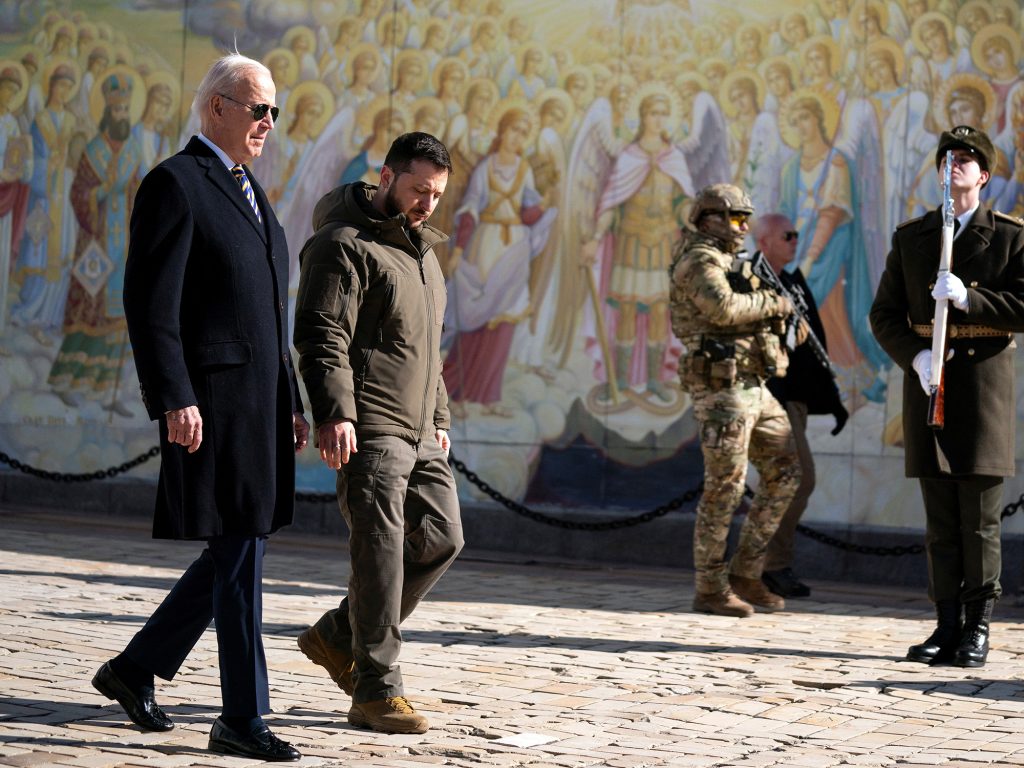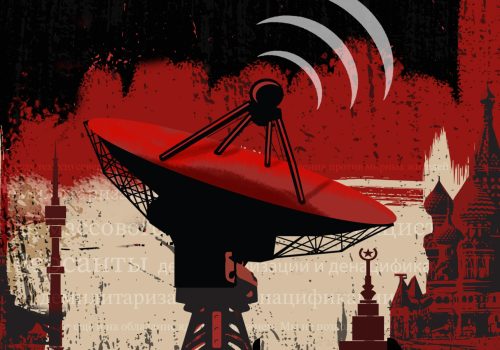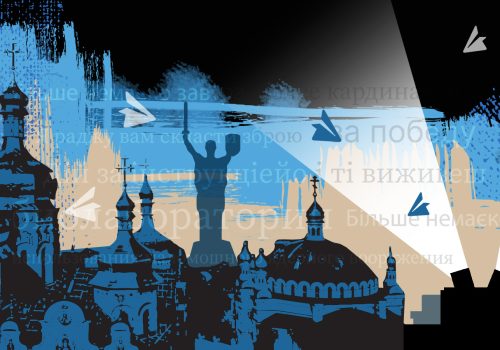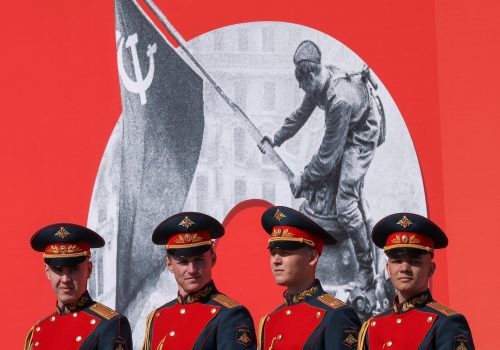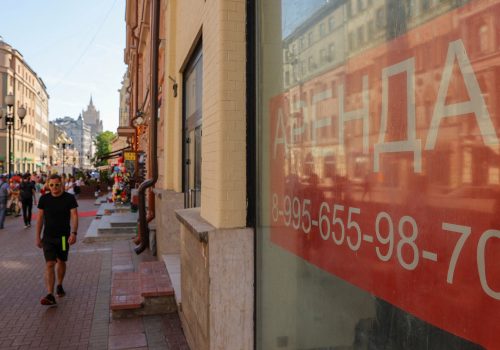Biden’s brave visit to Ukraine this week prompted the Atlantic Council’s Daniel Fried to compare it to former US President John F. Kennedy’s “Ich bin ein Berliner” speech in 1963 and to former US President Ronald Reagan’s “Mr. Gorbachev, tear down this wall” speech in 1987.
Fried, a former ambassador to Poland, is right to rank Biden’s visit to Kyiv and his speech he gave the day after in Warsaw—the most powerful speech of his political lifetime—right up there with those two other great moments of presidential leadership in the defense of freedom.
In one respect, however, Fried is selling Biden short. The physical risk to Biden on his ten-hour train ride to Kyiv and his stroll around the active war zone with Ukrainian President Volodymyr Zelenskyy was far greater than it was during either Kennedy or Reagan’s visits to heavily fortified West Berlin.
In another respect, it is too soon to measure the historic magnitude of Biden’s Ukraine sojourn. That will depend on whether the United States and other Ukraine supporters can “surge”—increasing and accelerating their military, economic, and political support.
Kennedy’s speech, coming less than two years after the Berlin Wall’s construction, won its historic place only because the United States and its French and British allies were able to defend West Berlin’s freedom, although it was an isolated island surrounded by East Germany and far more numerous Warsaw Pact troops.
Reagan’s speech gained its lasting power because, in the end, former Soviet leader Mikhail Gorbachev and his East German allies did tear down that wall, marking the Cold War’s peaceful end.
Since then, NATO and the European Union have embraced former states of the Warsaw Pact and former parts of the Soviet Union as newly democratic partners— perhaps the fastest and largest expansion of democracy and free market prosperity in history. If Russian President Vladimir Putin is defeated, authoritarianism rebuked, and Ukraine rebuilt into a prosperous democracy, it could spark another such expansion. But if Putin has his way in Ukraine, it will only encourage more authoritarian excess and risk an unstable world that looks like the 1930s, when the unchecked rise of fascism and authoritarianism led to World War II.
In short, Putin’s war in Ukraine is a battle over what set of countries and what principles will shape the global future.
During my visit to the Munich Security Conference this month, I was encouraged that a consensus was finally emerging that ensuring Ukraine’s freedom will have no less an impact on the future shape of Europe than did the Berlin Wall’s collapse and German unification.
“It is better to stop him now, before more is demanded of the United States and NATO as a whole,” wrote former US Secretary of State Condoleezza Rice and former US Secretary of Defense Robert M. Gates (both honorary directors on the Atlantic Council’s Board of Directors) recently in the Washington Post. “We have a determined partner in Ukraine that is willing to bear the consequences of war so that we do not have to do so ourselves in the future.”
With historically high stakes, the United States and its allies still haven’t gone far enough in recognizing two significant facts.
First, it isn’t enough to save Ukraine: One must also strategically defeat Putin. It’s crucial that he and those who support him are forced to abandon Putin’s ambition to reconstitute a greater Russian empire through conquest. Putin won’t give up that goal as long as he remains in power and his military isn’t defeated.
“Vladimir Putin remains fully committed to bringing all of Ukraine back under Russian control or—failing that—destroying it as a viable country,” wrote Rice and Gates. “Both of us have dealt with Putin on a number of occasions, and we are convinced he believes time is on his side: that he can wear down the Ukrainians and that US and European unity and support for Ukraine will eventually erode and fracture.”
Second, although the consensus at the Munich Security Conference has shifted toward a deeper understanding of the historic consequences, the United States and Ukraine’s allies are far from the “war footing” that’s required to ensure Putin’s defeat.
The Biden administration deserves enormous praise for galvanizing allies and sustaining military and economic support for Ukraine over the past year. NATO hasn’t been this unified in common cause for more than three decades, with Finland and Sweden poised to join and strengthen the Alliance further.
Even with all that, however, the support doesn’t match the stakes.
A major new Russian offensive appears to be unfolding, with a renewed effort to capture Kyiv with an offensive from Belarus as one likely scenario. US Secretary of State Antony Blinken warned China not to provide Russia military support, underscoring a growing fear that the prospect of a Putin failure could bring Beijing more into the fray.
Putin last year began to mobilize an additional three hundred thousand men for the Russian army, has recruited another twenty thousand volunteers, and has let the Russian paramilitary organization Wagner recruit convicts for the fight, while pressing Belarus to join the battle as well.
This isn’t a time for half-hearted measures. Yet as the economic historian Adam Tooze pointed out in the Financial Times, the US spending on Ukraine is, proportionally speaking, fifteen times lower than US Lend-Lease aid to Britain in World War II. Now, as then, the United States and its allies must recognize the existential stakes of the conflict and step up accordingly.
Ukraine’s supporters must accelerate and increase the delivery of modern Western armor and combat aircraft; long-range artillery and missiles; large stocks of weapons-capable drones; and a layered air defense system capable against ballistic and cruise missiles, manned aircraft, and drones.
Most urgently, the United States and other suppliers must relax restrictions on the use of the equipment they provide. It is immoral not to allow Ukrainians to use these systems to strike the Russian military forces that are killing them, and their families, wherever the Russian troops are located.
It took guts and determination for Biden to visit Kyiv this week. It now will take a heightened level of resolve and allied common cause to ensure the visit marks the turning point required to hand Putin a lasting defeat. Only that can open the way for a better future, for Ukrainians and Russians alike.
Frederick Kempe is president and chief executive officer of the Atlantic Council. You can follow him on Twitter @FredKempe.
THE WEEK’S TOP READS
This week’s must read is Biden’s speech in Warsaw, perhaps the most powerful of his political career.
“As we gather tonight, the world, in my view, is at an—at an inflection point,” Biden said. “The decisions we make over the next five years or so are going to determine and shape our lives for decades to come. That’s true for Americans. It’s true for the people of the world.
“And while decisions are ours to make now, the principles and the stakes are eternal. A choice between chaos and stability. Between building and destroying. Between hope and fear. Between democracy that lifts up the human spirit and the brutal hand of the dictator who crushes it. Between nothing less than limitation and possibilities, the kind of possibilities that come when people who live not in captivity but in freedom. Freedom.” Read more →
#2 Biden’s Kyiv Visit Was Months in the Making
Sabrina Siddiqui | WALL STREET JOURNAL
In this compelling narrative, Sabrina Siddiqui, one of the two journalists on the Biden trip, recounts a secret evening flight, a tense nighttime train journey, and the triumphant meeting that capped it.
“Biden first flew to Ramstein Air Base in Germany, where the presidential aircraft remained with its shades down for the duration of its time on the ground. After dark, Air Force One flew to Poland’s AF1 Rzeszów-Jasionka Airport. From there, the entourage boarded trains destined for Kyiv. Much of the last leg, a 10-hour train ride, occurred in the dark so there was little visible beyond streetlights and the shadows of buildings in the distance.”
At one point in Kyiv, Siddiqui writes, “air raid sirens blared across the city as… Biden and Zelensky walked outside St. Michael’s Cathedral, a complex of sky-blue and golden buildings that in 2013 became a symbol of Ukrainian resistance against Russia’s ambitions across the region. Neither man reacted to the sirens, although they served as a reminder that the leaders were meeting in an active war zone and in a city that has been the target of Russian rockets.” Read more →
#3 What a year of war has revealed of three leaders
David Ignatius | WASHINGTON POST
David Ignatius offers a characteristically smart analysis of Biden, Putin, and Zelenskyy for the one-year mark of Russia’s full-scale invasion of Ukraine.
“War reveals the essential traits of human character that shape events,” Ignatius writes. “Who could have imagined that a Ukrainian comic actor named Volodymyr [Zelenskyy] would prove to be the first truly heroic leader of the 21st century. Who would have bet that Putin, the canny and cynical ex-KGB officer, would grossly misread both intelligence and history and ransom his country to what amounted to a fairy tale about the ‘oneness’ of Russia and Ukraine.”
“In the end,” Ignatius concludes, “war is a test of wills. Putin was convinced that his cold-eyed, brutal resolve would outlast everyone else’s. But a year on, Putin’s staying power begins to look questionable, while [Zelenskyy] and Biden have never looked stronger.” Read more →“
#4 How Putin blundered into Ukraine—then doubled down
Max Seddon, Christopher Miller, and Felicia Schwartz | FINANCIAL TIMES
Opening with a story of Russian Foreign Minister Sergei Lavrov learning that Putin had ordered the invasion of Ukraine after the fact, this astonishing in-depth piece of reporting from the FT provides a portrait of Putin’s hubris, isolation, and utter inability to admit his mistakes as he doubles down on his brutal invasion of Ukraine.
The FT reports that later on the day of the invasion, a group of oligarchs waited in the Kremlin for a meeting, when “one of the oligarchs spied Lavrov exiting another meeting and pressed him for an explanation about why Putin had decided to invade.”
“Lavrov had no answer: the officials he was there to see in the Kremlin had known less about it than he did. Stunned, the oligarch asked Lavrov how Putin could have planned such an enormous invasion in such a tiny circle—so much so that most of the senior officials at the Kremlin, Russia’s economic cabinet, and its business elite had not believed it was even possible. ‘He has three advisers,’ Lavrov replied, according to the oligarch. ‘Ivan the Terrible. Peter the Great. And Catherine the Great.’”
The report should be read in its entirety for a fascinating window into Putin’s wartime Russia and his doubling down on the invasion. Read more →
#5 Ukraine Is the West’s War Now
Yaroslav Trofimov | WALL STREET JOURNAL
In this powerful piece, Yaroslav Trofimov examines how support for Ukraine has increased dramatically in the face of Russian brutality and incompetence—and as the stakes of the conflict have grown more apparent.
“It’s not just the fate of Europe that is being decided on the battlefields of Ukraine where Russia has regained momentum after a mobilization last fall and is launching renewed offensives,” Trofimov writes. “In Asia, the Middle East, and elsewhere, the West’s geopolitical adversaries are calculating whether the [United States] and its allies have the stamina and cohesion to defend the rules-based international order that has benefited the West for decades. In particular, the future of Taiwan and the South China Sea is closely linked to the West’s record in Ukraine.”
Trofimov quotes NATO Secretary General Jens Stoltenberg’s warning at the Munich Security Conference: “Beijing is watching closely, to see the price Russia pays, or the reward it receives, for its aggression. What is happening in Europe today can happen in Asia tomorrow. If Putin wins in Ukraine, the message to him and other authoritarian leaders will be that they can use force to get what they want. This will make the world more dangerous and us more vulnerable.”
In short, the future of the global order is at stake. Read more →
Atlantic Council top reads
Image: US President Joe Biden walks with Ukrainian President Volodymyr Zelenskyy at St. Michael's Golden-Domed Cathedral during an unannounced visit, in Kyiv, Ukraine, on Monday, Feb. 20, 2023. Photo via Evan Vucci/Pool via REUTERS.
